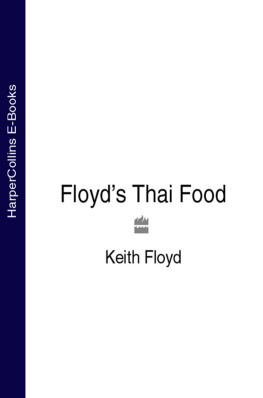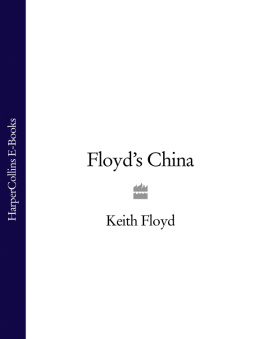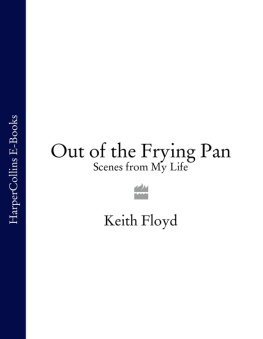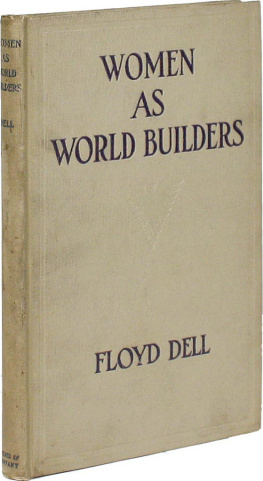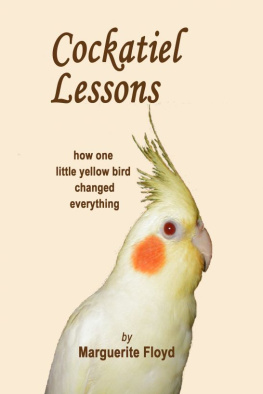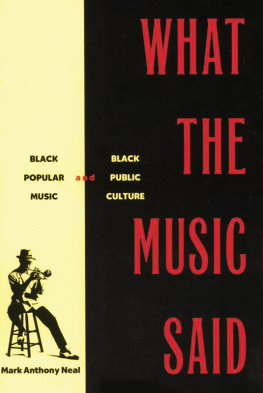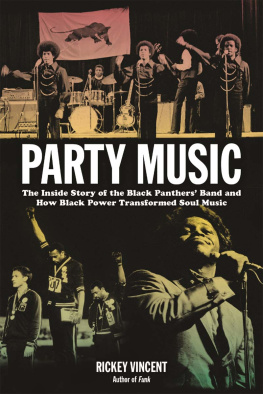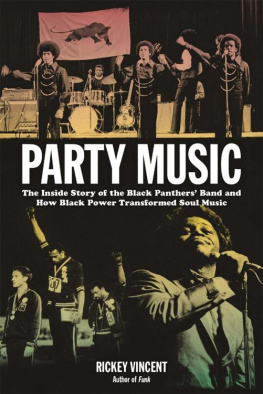Floyd - The Power of Black Music
Here you can read online Floyd - The Power of Black Music full text of the book (entire story) in english for free. Download pdf and epub, get meaning, cover and reviews about this ebook. year: 1995, publisher: Oxford University Press USA - OSO, genre: Religion. Description of the work, (preface) as well as reviews are available. Best literature library LitArk.com created for fans of good reading and offers a wide selection of genres:
Romance novel
Science fiction
Adventure
Detective
Science
History
Home and family
Prose
Art
Politics
Computer
Non-fiction
Religion
Business
Children
Humor
Choose a favorite category and find really read worthwhile books. Enjoy immersion in the world of imagination, feel the emotions of the characters or learn something new for yourself, make an fascinating discovery.

The Power of Black Music: summary, description and annotation
We offer to read an annotation, description, summary or preface (depends on what the author of the book "The Power of Black Music" wrote himself). If you haven't found the necessary information about the book — write in the comments, we will try to find it.
The Power of Black Music — read online for free the complete book (whole text) full work
Below is the text of the book, divided by pages. System saving the place of the last page read, allows you to conveniently read the book "The Power of Black Music" online for free, without having to search again every time where you left off. Put a bookmark, and you can go to the page where you finished reading at any time.
Font size:
Interval:
Bookmark:
THE POWER OF BLACK MUSIC
Interpreting Its History from Africa to the United States
Samuel A. Floyd, Jr.

Oxford University Press
Oxford New York
Athens Auckland Bangkok Bombay
Calcutta Cape Town Dar es Salaam Delhi
Florence Hong Kong Istanbul Karachi
Kuala Lumpur Madras Madrid Melbourne
Mexico City Nairobi Paris Singapore
Taipei Tokyo Toronto
and associated companies in
Berlin Ibadan
Copyright 1995 by Samuel A. Floyd, Jr.
First published in 1995 by Oxford University Press, Inc.,
198 Madison Avenue, New York, NY 10016
First issued as an Oxford University Press paperback, 1996
Oxford is a registered trademark of Oxford University Press
All rights reserved. No part of this publication may be reproduced,
stored in a retrieval system, or transmitted, in any form or by any means,
electronic, mechanical, photocopying, recording, or otherwise,
without the prior permission of Oxford University Press.
Library of Congress Cataloging-in-Publication Data
Floyd, Samuel A.
The power of Black music : interpreting its history from Africa
to the United States / Samuel A. Floyd, Jr.
p. cm. Includes bibliographical references, discography,
filmography, and index.
ISBN 0-19-508235-4
ISBN 0-19-510975-9 (Pbk.)
1. Afro-AmericansMusicHistory and criticism.
2. MusicUnited StatesHistory and criticism.
ML3556.F65 1995 780.8996073dc20 94-21
Since this page cannot legibly accommodate the acknowledgments,
pages v-vi constitute an extension of the copyright page.
2 3 4 5 6 7 8 9 10
Printed in the United States of America
on acid-free paper
Text
Birago Diop, poem, from African Music: A Peoples Art by Francis Bebey.
Copyright 1975 by Francis Bebey.
Reprinted by permission of Lawrence Hill Books.
The Pigs Nose and the Baboons Rear and Why Monkeys Live in Trees,
from African Folktales: Traditional Stories of the Black World by Roger D. Abrahams.
Copyright 1983 by Roger D. Abrahams.
Reprinted by permission of Pantheon Books, a division of Random House, Inc.
Esu trickster tale, from Tales of the Orishas by Migene Gonzles-Wippler.
Copyright 1985 by Original Publications.
Reprinted by permission of Original Publications.
Big Chief Blues, Boxcar Blues, C and A Blues, Panama Limited, and Papa Long Blues,
from Blues Lyric Poetry: An Anthology and a Concordance by Michael Taft.
Copyright 1983 by Garland Publishing.
Reprinted by permission of Garland Publishing.
Oscar Brown, Jr., Signifyin Monkey, from Talk that Talk: An Anthology of African-American Storytelling,
edited by Linda Goss and Marian E. Barnes.
Copyright 1989.
Reprinted by permission of Simon and Schuster.
Langston Hughes, poem, from Selected Poems by Langston Hughes.
Copyright 1959.
Reprinted by permission of Alfred A. Knopf, Inc.
African-American toast, from Deep Down in the Jungle:
Negro Narrative Folklore from the Streets of Philadelphia by Roger D. Abrahams.
Copyright 1963, 1970 by Roger D. Abrahams.
Reprinted by permission of Aldine de Gruyter.
Eero Tarasti, excerpt from Myth and Music: A Semiotic Approach to the Aesthetics of Myth in Music,
Especially that of Wagner, Sibelius, and Stravinsky by Eero Tarasti.
Copyright 1979 by Mouton de Gruyter.
Reprinted by permission of Mouton de Gruyter, a division of Walter de Gruyter and Co.
Claude McKay, If We Must Die, from Selected Poems of Claude McKay.
Copyright 1979.
Reprinted by permission of the Archives of Claude McKay, Carl Cowl, Administrator.
Dudley Randall, poem, from The Black Poets, edited by Dudley Randall.
Copyright 1971, 1988.
Reprinted by permission of Bantam, Doubleday, Dell.
Larry Neal, Malcolm XAn Autobiography, from The Black Poets, edited by Dudley Randall.
Copyright 1971, 1988.
Reprinted by permission of Evelyn Neal.
Musical Examples
Example 1: Adzida Dance, from Studies in African Music by A. M. Jones.
Copyright 1959 by Oxford University Press. Reprinted by permission of Oxford University Press, Inc.
Example 2: Runagate, Runagate by Wendell Logan, set to poem by Robert Hayden.
Reprinted with permission of MMB Music, Inc., St. Louis.
Copyright 1989. All rights reserved.
Examples 3 and 4: For You There Is No Song by Leslie Adams.
From Anthology of Art Songs by Black American Composers, compiled by Willis C. Patterson.
Copyright 1977 by Edward B. Marks Music Company.
Reprinted by permission of Edward B. Marks Music Company.
Text from Collected Poems of Edna St. Vincent Millay, edited by Norma Millay Ellis.
Copyright 1981. Reprinted by permission.
Example 5: Dancing in the Sun by John W Work, set to poem by Howard Weedun.
Reprinted by permission of the composers family.
Example 6: Soliloquy by John W. Work, set to poem by Myrtle Vorst Sheppard.
Reprinted by permission of the composers family.
Example 7: A Red, Red Rose by George Walker, set to poem by Robert Burns.
Reprinted with permission of MMB Music, Inc., St. Louis.
Copyright 1975. All rights reserved.
Example 8: Faithful One by Robert Owens, set to poem by Langston Hughes.
Copyright 1969.
Reprinted by permission of Orlando-Musikverlag, Munich, Germany.
Example 9: Velvet Shoes by Hale Smith, set to poem by Elinor Wiley.
Copyright 1974 by Edward B. Marks Music Company.
Reprinted by permission of Edward B. Marks Music Company.
Examples 10 and 11: Two Songs for Julie-Ju by Noel DaCosta, set to poems by George Houston Bass.
Copyright 1977 by Edward B. Marks Music Company.
Reprinted by permission of Edward B. Marks Music Company.
Example 12: A Song Without Words by Charles Brown.
Copyright 1977.
Reprinted by permission of the composer.
Example 13: A Death Song by Howard Swanson, set to a poem by Paul Laurence Dunbar.
Copyright 1951 by Weintraub Music, a division of Music Sales Corporation (ASCAP).
Reprinted by permission.
For
Theora
Barbara
Wanda
Cecilia
Sam III
For their contributions to the inspiration and support I needed to undertake this project, I would like to thank James Winn, director of the Institute for the Humanities, University of Michigan, whose fellowship support allowed me to explore the implications of critical theory to black music inquiry; Richard Crawford, professor of music at the University of Michigan, whose friendship, sharp and scholarly eye, and helpful criticism made my introductory article in this area better than it otherwise would have been; Orin Moe, my remarkably well-read friend who called my attention to Peter Kivys four books on the philosophy of music and Lawrence Kramers work on musico-literary analysis; and Bruce Tucker, guest editor of an issue of the Black Music Research Journal, for inviting me to submit the article in which many of these issues were first raised, for contributing to the identification of one of the seminal ideas in that piece, and for reading portions of the present work. It was Bruce, a former colleague at Fisk University and now a freelance writer, who encouraged me to write The Power of Black Music from a personal perspective. Rich Crawford, Marsha J. Reisser, and singer William Brown read the entire manuscript and offered corrections and valuable content and editorial suggestions. William Komla Amoaku critiqued by the assistance of Virginia McLaurin, of the Vivian Harsh collection of the Carter G. Woodson branch of the Chicago Public Library System. The librarians at the Columbia College Library were extremely helpful, especially Paula Epstein, who not only did not tire of my constant requests for help but went further than I would have expected in locating hard-to-find citations and materials. And the fine staff at the Center for Black Music Research performed in superb fashion, providing research and material needs on consistently short notice; my thanks go especially to Suzanne Flandreau, Marcos Sueiro, and Richard Barnes. The untiring work of Deborah Coney, my former secretary in the deans office at Columbia College, in acquiring books and articles for me, was indispensable and is very much appreciated. My brief stint as a Fellow of the National Humanities Center, in Research Triangle Park, North Carolina, made it possible for me to bring my work to completion well before my submission deadline. Special thanks are due Dominique-Ren de Lerma, who over the past twenty years has generously shared with me, and with numerous others, information in his files and an extensive database of names of black composers and the titles of their compositions. Susan Allan deserves thanks for editing early drafts of each of the books chapters, and Chris Rohmann for his masterful editing of the final draft. Finally, my thanks go to Sheldon Meyer, my editor at Oxford, who encouraged the development of this book and helped facilitate its completion.
Next pageFont size:
Interval:
Bookmark:
Similar books «The Power of Black Music»
Look at similar books to The Power of Black Music. We have selected literature similar in name and meaning in the hope of providing readers with more options to find new, interesting, not yet read works.
Discussion, reviews of the book The Power of Black Music and just readers' own opinions. Leave your comments, write what you think about the work, its meaning or the main characters. Specify what exactly you liked and what you didn't like, and why you think so.

